Puppy’s First Days at Home!
A few tips from us…making the first days and first weeks an easy transition…
I hope that you will enjoy your new puppy, and that he/she will soon feel a part of your family. Have patience, as it may take him several days to adjust to his new surroundings. We would like to offer a few suggestions that we feel will hasten this adjustment:
Your puppy is now eating solid food. There is no need to grind food, or to add milk or soft dog food. Your dog’s breath, and dental health will be good throughout its life if you do not feed soft dog food. Up until now your pup has had food available at all times, but now that you are house training, you will want to go to a 2/3 times a day feeding regimen so that potty times are predictable (within 5-10 minutes from feeding time…your pup will have his very own exact schedule) If you work during the day, feed once in a.m., allowing puppy to potty before you leave, and once when arriving home for the same reason. If you are home all day, you may feed 3 times daily.
Sometimes, a bout with “the runs” will occur after taking puppy home. This can be due to stress of new surroundings, new food, and new water. If puppy continues to eat and drink normally, don’t worry, your problem should solve itself in a few days. Feed white rice till the diarrhea stops, along with bottled water. Have pepto bismol ON HAND when you get home with your pup! (Only give bottle spring water such as Aquafina or Poland Spring for the first 10 days, then start mixing it half and half to transfer to your tap or well water) Feeding yogurt for the first 4 weeks will help boost their immune system. If the diarrhea continues for more than two days, or puppy is not drinking or eating and is lethargic, then poisoning or Coccidia (a bacteria picked up by pups) could be the cause…take the pup to your vet! Puppies stool should be like soft serve ice cream (Gross, I know…) but it is when it is WATERY that there is concern. Sometimes stress of traveling can trigger a bout with diarrhea for a couple days. Take a stool sample to vet within the first week of pup being home, although your pup has been wormed, pups can re-infest themselves, so you may need more wormer to decrease the symptoms.
Your puppy will naturally need to chew while losing baby teeth, but supply a Nylabone “pooch pacifier” that puppy can chew on and not “chew APART (we include several of these in our “Crate Package”) Rawhides only teach dogs to chew things apart. This will help protect your favorite pair of shoes! If your puppy “play bites”, this is normal, as this is how a litter of puppies play with each other. It sounds weird, but to avoid lots of “hitting” on the nose or yelling, when your pup bites down on you or your child’s finger, take a finger with no nail, and stick it far down his throat. It is humane, yet uncomfortable enough that puppy will think twice next time! Make sure the whole family is consistent with all training methods, otherwise puppy will learn to respect only the one who carries through with discipline! If you do not deal with this quickly and swiftly the first couple of days after your puppy arrives home, you will NOT be able to correct it later. [ilink url=”https://emlabradors.com/2013/02/how-do-i-get-my-puppy-to-stop-biting/”]How do I get my puppy to stop play-biting?[/ilink]
I could write a book on housebreaking alone…but a few suggestions that we might make are: Take puppy out first thing in morning, after each meal, after nap time, after playing, and last thing before bedtime. Praise him highly when he goes outside, and scold him with a firm “no” when he has an accident in the house. When he eliminates outside, mark the spot, and each time, take him to that same spot, he will soon learn to eliminate whenever taken out and he smells the familiar smell ( you can also train them to go in the same area of your yard this way!) After he has gone outside, let him have the freedom of the house, or a confined area such as a kitchen. A dog crate, or kennel will come in handy when you are away or too busy to watch puppy. The puppy will usually be clean and will not want to dirty his box if the box is small enough that he cannot eliminate in one end and sleep in the other. (SEE our insert on Crate Training contained in your puppy care kit) If you can concentrate on the house-training the first two weeks you will not encounter many problems thereafter.
Do not play rough with your puppy! Don’t let the puppy develop bad habits such as jumping up on you, biting at clothing, etc. You must remember that your dog will weigh from 65-95 pounds at maturity. Some of the bad habits that he develops as a small puppy will certainly not be desirable when he grows older. Don’t let him get by with anything as a puppy that you won’t want him to do when he is older and much larger! [ilink url=”https://emlabradors.com/2013/07/how-to-break-your-lab-of-the-jumping-up-habit/”]How to break your lab of the jumping habit[/ilink]
The first night is often the most difficult; you may place a hot water bottle filled with warm water, wrapped in a towel, in puppy’s crate to simulate another pup. Also, if you have played with puppy a lot and held him the first day, take off the shirt you have worn and place in puppy’s crate. Familiar smells always comfort a canine. A ticking alarm clock (heart rhythm), or a clock radio (voice) by crate can also be soothing. Otherwise, hang in there, it won’t be long before your pup will be sleeping through the night on its own. Some people advise to rub a towel or blanket on the mama dog before you take pup home so that he has something to smell her on. We don’t really advise this as the pups are already weaned for at least a week before they go home at 8 weeks (trust me, with those sharp teeth and nails, mama is ready to be done!). It’s more so being away from their litter mates that they have to adjust to.
Of course, your pup will have been wormed and have received its first vaccine when you pick him up. The next vaccine will be due a month from the date of pick up. We recommend that you take your pup to your vet within the first week after receiving him just for a “well puppy check-up” (for your peace of mind, and for your own protection), and to make an appointment for his next vaccine. Also take a stool sample to your vet during this first visit to double-check that puppy is all clear of parasites. Even though we worm the pup, sometimes puppies can re-infest themselves (they are not picky about where they step and what they eat sometimes!) so we have you double-check once puppy arrives at your home and is separated from the rest of the litter.
Here are some other helpful tips for bringing home the new baby! 🙂
[ilink url=”https://emlabradors.com/2012/12/puppy-proofing-your-home/”]Puppy Proofing Your Home[/ilink]
[ilink url=”https://emlabradors.com/2012/12/labrador-crate-training-manual/”]Labrador Crate-Training Manual[/ilink]
[youtube width=”1000″ height=”688″]https://www.youtube.com/watch?v=bq8qdq7N2Ho[/youtube]
Related Articles
DO NOT BUY A PUPPY OR DOG UNTIL YOU READ THIS!!! (Donna\’s full-length memoir/Labrador History)
Why your Lab should stop biting and jumping on–GET THIS!!–DAY #1!!!
Purebred Thefts on the Rise! (and in the news)
Does your Pet Shampoo contain these harmful chemicals?
Buyer Beware
Am I crazy to want two puppies??

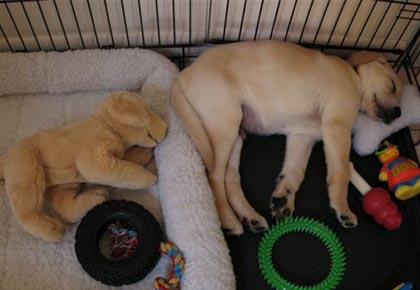
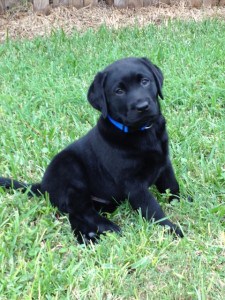
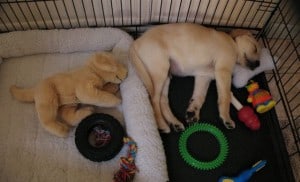
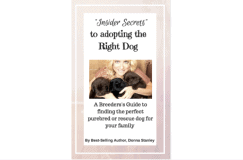
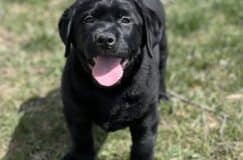


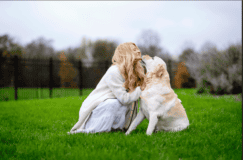
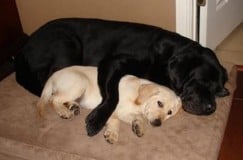
12 Comments